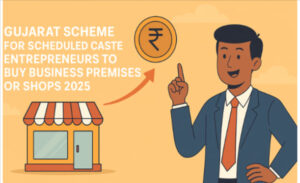The Dr. P. G. Solanki Scheme is a long-standing initiative launched in 1973 by the Directorate of Scheduled Caste Welfare, under the Department of Social Justice & Empowerment, Government of Gujarat. This scheme is aimed at supporting Scheduled Caste law graduates in starting their independent legal practice by offering financial assistance for setting up business premises or offices.
Key Highlights of Gujarat SC Law Graduates Loan Assistance
-
Scheme Name: Dr. P. G. Solanki Scheme for SC Law Graduates
-
Launch Year: 1973
-
Department: Scheduled Caste Welfare, Government of Gujarat
-
Loan Amount: ₹7,000 at 4% interest
-
Subsidy Amount: ₹5,000 (non-refundable grant)
-
Total Support: ₹12,000 for setting up a law practice
-
Purpose: To assist in the purchase or rental of office/shop premises for legal practice
-
Application Mode: Online & Offline
Benefits of the Scheme
-
Total Financial Assistance: ₹12,000
-
₹7,000 as a loan at 4% interest
-
₹5,000 as subsidy (non-repayable)
-
-
Helps law graduates set up independent legal offices
-
Encourages self-reliant careers among Scheduled Caste advocates
Eligibility Criteria
-
Must be a law graduate
-
Must belong to the Scheduled Caste (SC) category
-
Must be a native/resident of Gujarat
-
Annual family income should not exceed ₹6,00,000 (rural or urban)
-
Must be registered with the Bar Council
-
A copy of the registration certificate and the fee receipt is mandatory
-
How to Apply
Online Process via e-Samaj Kalyan Portal
- Interested and eligible applicants can visit the e-Samaj Kalyan Portal.
-
Click ‘Citizen Login’ → ‘New User – Please Register Here’
-
Fill in details: Name, Aadhaar, DOB, Caste, etc., and click ‘Register’
-
Log in with User ID and Password
-
Update your User Profile
-
Select the Dr. P. G. Solanki Scheme from the homepage
-
Fill out the application form and upload the required documents
-
Agree to the terms and click ‘Save Application’
-
Submit and print the form for reference
-
Track your application status using the application number
Offline Process
-
Visit the Scheduled Caste Welfare Office in your district
-
Collect the application form
- Or directly download the Loan & Assistance Scheme Form from here.
-
Fill it out, attach documents, and submit to the concerned authority
-
Obtain an acknowledgment receipt with reference number
Necessary Documents for Application
-
Passport-size Photograph
-
Aadhaar Card
-
SC Caste Certificate
-
Income Proof (Annual family income statement)
-
Residence Proof (Electricity Bill, Rent Agreement, Ration Card, etc.)
-
Bar Council Registration Certificate and Fee Receipt
-
Office Rent Slip (for one year)
-
Marksheet and Certificate of Law Graduation
-
Legal Work Experience Certificate (if available)
-
Surety Bond (Form-A)
-
First Page of Bank Passbook or Cancelled Cheque
-
Any other documents as requested by the department
FAQs
Q: When was this scheme launched?
The scheme was launched in 1973.
Q: What does the scheme provide?
₹12,000 total: ₹7,000 loan @4% interest and ₹5,000 subsidy for setting up a law office.
Q: Who is eligible for the scheme?
SC law graduates from Gujarat with family income below ₹6 lakh per annum.
Q: Can someone from another state apply?
No, only residents of Gujarat are eligible.
Q: What can the loan amount be used for?
To purchase or rent premises/shops to begin legal practice.
Q: How can I apply?
Either online via the e-Samaj Kalyan Portal or offline at the SC Welfare Office.

